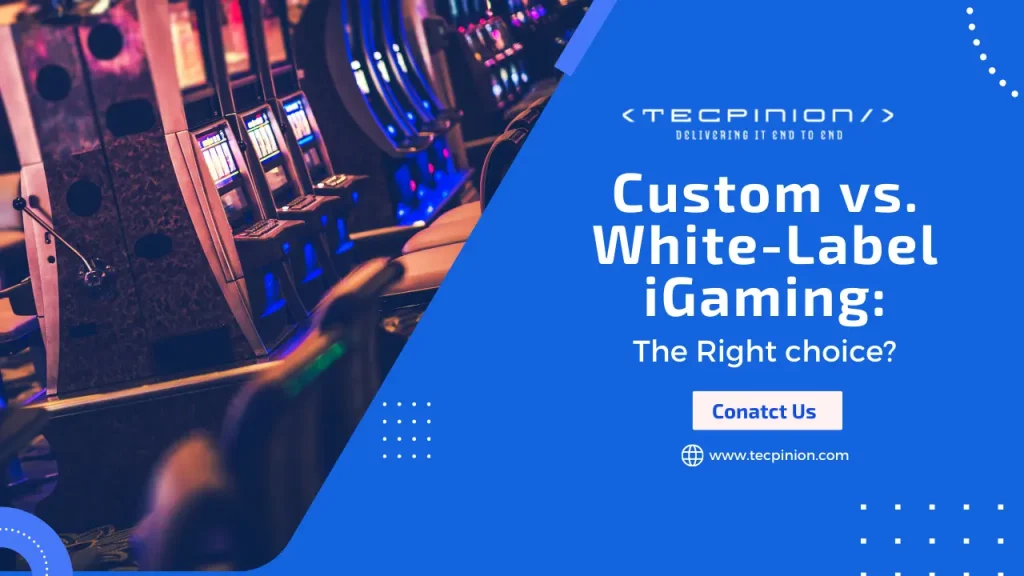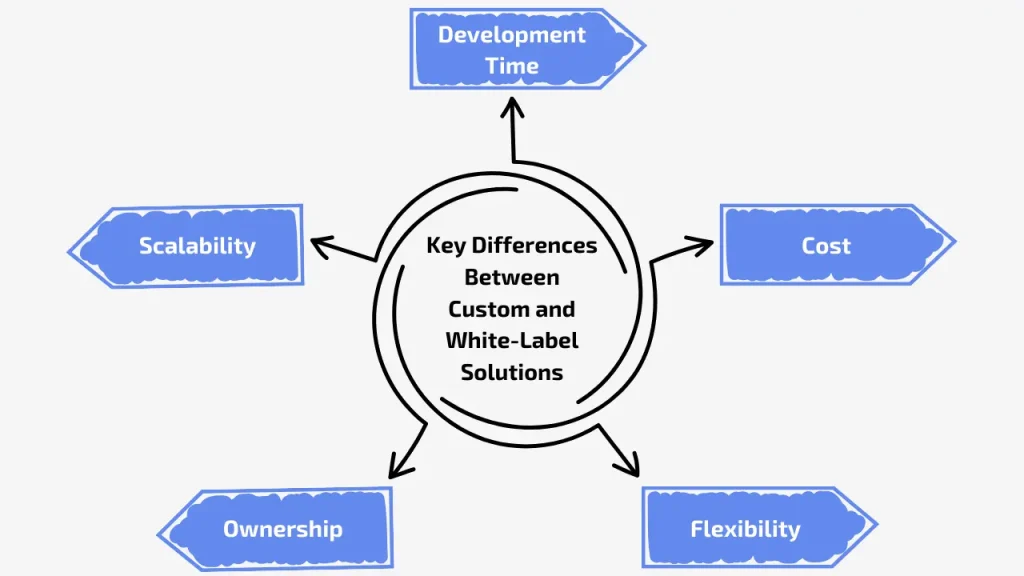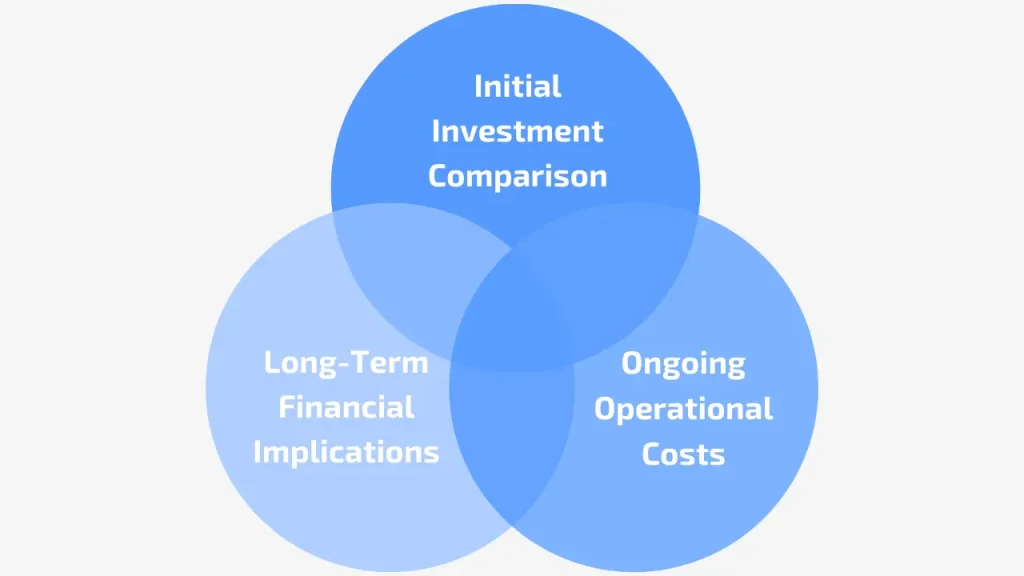Custom vs. White-Label iGaming Solutions: What’s the Best Choice for Operators?

The iGaming industry has experienced substantial growth in recent years, driving a heightened demand for sophisticated technology solutions to support this expansion. Operators can choose between two main options for building an iGaming platform: Custom solutions, which are specifically tailored to an operator’s unique requirements, and White-Label solutions, which offer ready-made platforms that can be quickly branded and launched. This article explores the benefits and challenges of both options, helping operators make an informed decision that aligns with their business goals and maximizes their chances of success.
Table of Contents
Introduction
The iGaming industry has experienced substantial growth in recent years, driving a heightened demand for sophisticated technology solutions to support this expansion. Operators can choose between two main options for building an iGaming platform: Custom solutions, which are specifically tailored to an operator’s unique requirements, and White-Label solutions, which offer ready-made platforms that can be quickly branded and launched. This article explores the benefits and challenges of both options, helping operators make an informed decision that aligns with their business goals and maximizes their chances of success.
Current Market Stats
What are Custom iGaming Solutions?
Key Features:
-
Full Control over Branding, User Interface, and Experience:
Operators can design and customize every platform aspect, ensuring the look, feel and flow align perfectly with their brand identity.
-
Flexibility in Integrating Unique Features and Services
Custom solutions including specialized game offers, unique payment methods, or special promotions combining certain components help the operator stand out from competitors.
-
Scalability Based on Growth
Designed to change with the operator's company, these solutions allow growing player bases and rising needs for more content, features, and functionality.
Benefits:
-
Unique Player Experience
The customization options allow for a distinct gaming environment, which can create a loyal player base.
-
Full Ownership and Control
Operators have complete control over their platform, enabling them to make adjustments and innovations as needed without relying on third-party restrictions.
-
Long-Term Growth Potential
Developing custom solutions can be a never-ending process, meaning that they can be improved in the long run to meet future challenges, in which they can also be optimized and effectively adapted to the changing situations of the industry.
Challenges:
-
High Development Costs
Developing a custom platform requires a significant upfront investment in development, design, and testing.
-
Longer Time to Market
Building a platform from scratch can take longer, meaning operators may experience delays before launching.
-
Requires Ongoing Maintenance and Updates
Continuous upkeep, such as software updates, bug fixes, and security patches, is necessary to keep the platform running smoothly, which requires dedicated resources.
What are White-Label iGaming Solutions?
White-Label iGaming solutions are pre-built, ready-to-use platforms that operators can quickly brand and launch without developing the software. These solutions allow businesses to enter the iGaming market swiftly with minimal technical barriers.
- Key Features:
- Pre-existing Software Infrastructure and Back-End Management Systems: White-label platforms come with off-the-shelf back-end systems such as databases, user management, and reporting tools which cut setup times.
- Simple Branding and Customization Options: Operators can embed their brand identity, adjust the user interface, and apply specific themes to match their brand identity, although customization is typically limited compared to custom solutions.
- Instant Access to Games, Payment Gateways, and Compliance Tools: These platforms offer access to a wide range of games, integrated payment processing options, and compliance features, which in turn are allowing operators to quickly make available more innovative and efficient gaming platforms.
- Benefits:
- Quick Time-to-Market: White-label solutions allow operators to enter the market rapidly, often within weeks instead of months or years.
- Lower Upfront Costs: Since the platform is pre-built, operators avoid the significant costs of custom development and can focus on branding and marketing.
- Technical and Customer Support Included: Most white-label providers help operators by providing continuous support for technical problems, platform maintenance, and customer service, therefore lowering their running costs.
- Challenges:
- Limited Customization and Flexibility: There are fewer opportunities to make big changes to the platform’s features or design, which may limit an operator’s ability to stand out in a competitive market.
- Less Differentiation from Competitors: Since other operators may use the same platform, creating a unique player experience or brand identity can be difficult.
- Dependency on the Provider for Updates and Improvements: Operators rely on the white-label provider for software updates, new features, and improvements; they will have complete control over the future development of the platform, and therefore be more responsive to the ever-changing market needs.
Key Differences Between Custom and White-Label Solutions:

- Development Time: Custom solutions take longer, while White-Label options are ready for quick deployment.
- Cost: Custom solutions are generally more expensive than White-Label solutions.
- Flexibility: Custom solutions offer more control over design and functionality, while White-Label solutions have limited customization.
- Ownership: The operator owns Custom solutions, whereas the provider owns White-Label solutions.
- Scalability: Custom solutions scale easily with business growth, while White-Label solutions may face limitations based on the provider’s infrastructure.
Which Option is Best for Different Operators?
- For New Operators: White-label products are useful for testing the market and entering new areas since their low cost and quick introduction make them perfect.
- For Established Operators: Custom solutions offer better scalability and differentiation and help build a unique brand focusing on long-term strategy.
- For Operators with Specific Needs: Dealing with niche games, sophisticated features, or complicated legal restrictions calls for custom solutions—that which provide the freedom required.
Cost Considerations

Initial Investment Comparison:
- Custom Solutions: Custom platforms typically require a higher upfront investment. Operators must pay for the full development process, including design, coding, testing, and deployment. This investment can be substantial, depending on the complexity of the solution and the resources required.
- White-Label Solutions: White-label platforms generally have lower initial costs, as the software is pre-built and ready to use. Instead of a large one-time payment, operators usually pay a subscription or licensing fee, which is more affordable in the short term.
Ongoing Operational Costs:
- Custom Solutions: With a custom solution, ongoing costs are primarily related to maintenance, software updates, bug fixes, and the need for a dedicated in-house or outsourced team to manage and support the platform. These expenses can increase, especially if the platform requires frequent updates or has complex features.
- White-Label Solutions: Ongoing costs for white-label platforms include subscription fees, licensing costs, and possible transaction fees, as well as any costs for additional features or services. The provider typically manages platform maintenance, security updates, and customer support, which can lower operational costs for the operator.
Long-Term Financial Implications:
- Custom Solutions: In the long term, custom solutions can trip and result in increased revenue due to the fact that the operator possesses the platform and is able to scale up or improve it regularly. The lack of licensing fees means that, over time, the operator could see higher profit margins as the platform becomes more efficient and better aligned with its business model.
- White-Label Solutions: White label platforms do come at a cheaper initial cost, they come with ongoing subscription and licensing fees. Over time, these fees can accumulate, potentially reducing profitability. Furthermore operators can have restrictions in growing and customizing, which would affect long-term scalability and income possibilities. For operators trying to reduce risk and increase short-term revenue, the lower starting expenses and hands-off approach can be more appealing, nevertheless.

The Importance of Support and Maintenance in Custom and White-Label Solutions
White-Label Solutions: In Contract, white-label solutions are provided by third-party vendors who come with their support and maintenance services. They are regularly updated but may be very firm and slow to change when the operator needs them to, for the maintenance and update cycles of a vendor to hinder the operator’s quick reaction time and provide less customization than systems designed from scratch.
Final Thoughts
FAQs
- Which option is more cost-effective for new iGaming operators?
- How long does it take to launch a platform with a white-label solution vs. a custom solution?
- What level of control does an operator have over the platform with a white-label solution?
- What level of customization is available with a custom iGaming solution?
- Which solution is easier to maintain and update?
- Which option is best for an operator with no technical expertise?
Want To Know More
About iGaming Platform
Read Out The Related Blogs
Recent Post
-
Are All Sweepstakes Casinos Social Casinos? Debunking Common Misconceptions
-
Why Multi-Language Support is Essential for Online Casino Affiliate Success in 2025
-
Best Crypto Casino Software Providers: A Guide to Picking the Right One
-
The Ultimate List of Top 10 Sweepstakes Casino Apps in the USA 2025
-
Top B2B iGaming Platform Companies You Should Know in 2025

